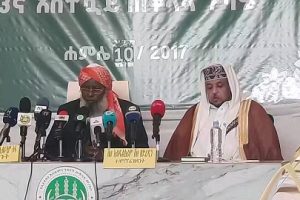
Surveying a 40-hectare plot in the centre of Addis Ababa, Ethiopia’s capital, Abiy Ahmed, the most talked-about leader in Africa, sets out his grand plans for transforming Ethiopia. In an act of political theatre, he leads the Financial Times (FT) on a tour of the prime ministerial grounds….
In Mr. Abiy’s first one-on-one interview with the international media since he was catapulted to the premiership last April, he alternates between homespun prophet, hard man and visionary leader. He mixes humour with a tactile arm-grab worthy of LBJ. His sentences, delivered in proficient English, are laced with biblical references, big data and Michael Jackson. Committed to opening up Ethiopia’s closed political system, he is fascinated by the nature of popularity. “If you change this,” says Mr. Abiy, gesturing to the rubble-strewn compound and the rapidly changing skyline in the capital beyond, “you can change Addis. And if you can change Addis, definitely you can change Ethiopia.”
Improving his own surroundings, he says, is a metaphor for the transformation of a country that has, for 15 years, been the best-performing economy in Africa, but whose authoritarian government provoked a sustained popular uprising. On his first day, he says, he ordered an overhaul of his office. In two months, what had been a dark and austere interior became a blindingly white luxury-hotel-style affair, replete with wall-to-wall videoconferencing screens, modern art and sleek white rooms for cabinet meetings and visiting delegations.
…. “I want to make this office futuristic. Many Ethiopians see yesterday. I see tomorrow,” he says. “This place has gone from hell to paradise.”
The youngest leader in Africa at 42, Mr. Abiy is building a digital museum to celebrate Ethiopia’s history, a mini-Ethiopian theme park and a zoo with 250 animals. He envisages thousands of paying visitors coming each day. “This is a prototype of the new Ethiopia,” says the former army intelligence officer and software engineer. “I have done so many great things compared to many leaders. But, I didn’t do 1 per cent of what I am dreaming.”
In a country where government spies were ubiquitous, people feel free to express opinions that a year ago would have had them clapped in jail. “He says the most unbelievable things and then he ends up doing them,” says Blen Sahilu, a lawyer and women’s rights activist, referring partly to the unexpected peace treaty with Eritrea that brought an end to more than 20 years of military stand-off. “In many ways, Abiy has been a shock to the system,” she says. “I’m still waiting to see whether the country can sustain that much change in such a short period of time and if these actions have a thoughtful follow-up strategy.”
Mr. Abiy’s emergence has unleashed opportunity and danger in equal measure. Some fear that rapid liberalization could spin out of control, leading to anarchy or violent ethnic separatism….
…..Over the objections of the Tigrayan People’s Liberation Front, one of the parties in the coalition, he was elected EPRDF chairman and hence prime minister, the first from Oromia in the nation’s history. “I knew when they kept insulting me that I had won,” he says. “I ignored it and wrote my acceptance speech.” Growing up poor, with a Muslim Oromo father and a Christian Amhara mother, in retrospect Mr. Abiy seemed destined for the job. He even speaks Tigrigna after spending time as a young soldier in Tigray province. Indeed, he claims he knew from the age of seven that he would one day lead the country. Oxford University’s Blavatnik School of Government, says Mr. Abiy’s historic task is to complete the economic transformation that Meles began. If South Korea’s miracle took 25 years, he says, “Ethiopia has completed half a miracle”.
Mr. Abiy must now oversee the political and economic liberalisation needed, he says, to keep rapid levels of growth going for a decade or more, which would bring the country comfortably into middle-income status. “Meles was too controlling, like Mao,” says Mr. Dercon …“But command and control only works so far. That makes Abiy like Deng Xiaoping,” he says, referring to the Chinese leader whose opening and reform from 1979 propelled China’s economic lift-off.
While Mr. Abiy remains wildly popular, particularly in the capital, not everything has gone his way. He has faced one assassination attempt. And on October 10, a cadre of junior officers forced their way into the compound demanding to be heard. “I showed them I was a soldier,” he recalls. “I told them, if something wrong happens, you can’t kill me before I kill five or six of you.” He followed up with a macho burst of press-ups. Inside an hour, the incipient coup was over.
…The prime minister hints he would like to tinker with the 1994 constitution, which some see as exacerbating ethnic rivalries but others regard as enshrining their rights. Such delicate changes, he adds, cannot be contemplated until he receives a hoped-for popular mandate in elections scheduled for next year. Some think the timing will slip. He would also like to move to a presidential system in which leaders are directly elected, he says, rather than the current indirect process conducted through an EPRDF-dominated parliament. While the prime minister preaches “unity of the nation and national pride”, the notion of a greater Ethiopia grates with those pressing for more regional autonomy.…
The Prime Minister professes to be unfazed by the forces he has unleashed. “Yesterday they were on the streets of Mekelle insulting me,” he says, referring to the Tigrayan capital. “But I love that. That is democracy.” Mr. Abiy says he wants to secure peace by persuasion, not through military pacification. “Negative peace is possible as long as you have a strong army. We are heading to positive peace,” he says. Ultimately, Mr. Abiy says, tensions will dissolve if the economy keeps expanding. “When you grow, you don’t have time for these communal issues.”
Keeping growth on track, he says, depends on dealing with past constraints, including debt and a seemingly perpetual foreign exchange crisis that puts import cover at barely two months. He also wants to tweak the Meles developmental model, where so much money was funneled into public investment that the private sector got crowded out. “Economically, we’re making big, big change, but the backlog is killing us. Today the debt is up to here,” he says, gesturing to his neck.
Describing himself as “capitalist”, he nevertheless cites Meles as saying it is the government’s job to correct market failures. “The economy will grow naturally, but you have to lead it in a guided manner.” Still, unlike Meles, Mr. Abiy is less wedded to the idea that the state must control the economy’s commanding heights. He is moving swiftly towards privatization of the telecoms sector in an exercise that should raise billions of dollars, as well as modernizing a network that has fallen badly behind African peers.
Here too there are risks. “I need to realize the privatization with zero corruption,” he says, adding that people who have stashed money abroad want to launder it back into the country. Successful privatization of telecoms could potentially lead to a similar exercise in energy and shipping, as well as sugar refineries and, most controversially, the successful national airline that has turned Addis Ababa into a continental hub. Mr. Abiy says that, for the moment at least, he draws the line at banking. “The biggest challenge for Abiy is not politics. It is jobs, jobs, jobs,” says Zemedeneh Negatu, an Ethiopian banker. With 800,000 students in university or college and 2.5 mln. Ethiopians being born each year, lack of opportunity could quickly catalyze unrest, he adds.
(Taken from Financial Times)
The Ethiopian Herald February 23/2019
BY DAVID PILLING AND LIONEL BARBER





